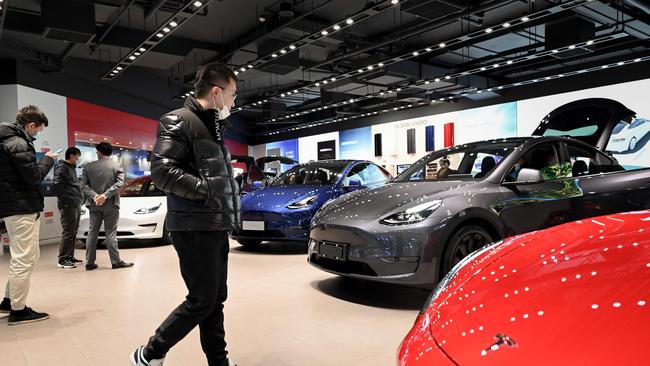Tesla starts delivering China-Made Model Y
The US carmaker is taking on the world’s biggest electric vehicle market.

Hello and welcome to The Download, The Australian’s technology blog for the latest tech news.
David Swan 4.20pm: Assembly Payments, BeforePay ink deal
Australian fintech start-up Assembly Payments has expanded a partnership with cash advance provider BeforePay, a deal the companies say will reduce ‘Pay On Demand’ approval time from 48 hours to just 60 seconds.
The two companies have worked together since 2019, and are leveraging the New Payments Platform (NPP) to deploy the new functionality.
BeforePay CEO and co-founder Tarek Ayoub said that his start-up has passed 200,000 registered users, and achieved 20 per cent month-on-month revenue growth. For a 5 per cent transaction fee, users are granted an interest-free deposit of up to $200 aimed at covering costs for unexpected bills or events ahead of an employee’s wage arriving in their bank account.
“Near instant payments gave our platform an immediate edge and competitive advantage as we aim to free up Australians’ wages on demand, so they can more confidently manage their budget,” Mr Ayoub said.
“The way Australians access their pay needs to catch up to modern lifestyles, and through our partnership with Assembly Payments we’re able to provide deposits within one minute compared to 48 hours.”
Tim Dickinson, co-CEO of Assembly Payments said: “It’s been exciting working with Beforepay, pioneering this new and impactful application for fast payments that’s helping thousands of Australian make ends meet during the pandemic.”
“This is also one example where adoption of new payments technology has given a company a clear competitive advantage. There are plenty of other use cases where moving towards fast payments can be transformative for a business.”
Chris Griffith 12.00pm: Parler gets help from Russian owned technology
Social media site Parler is using Russian owned technology to improve its security as part of its plan to get back online.
Reuters reports that the internet protocol address Parler is using is owned by DDoS-Guard, which it says is controlled by two Russian men and provides services including protection from distributed denial of service attacks.
It says DDoS-Guard has supported Russian government sites and conspiracy sites. Until recently it reportedly had ties with 8kun formerly 8chan which is a message board used by some extremists including the perpetrator of the Christchurch massacre in 2019.
CEO John Matze has told Fox News he is confident that Parler will return online by the end of January.
It also reports that Apple is moving ahead with its plan to diversify the production of iPads and MacBooks. The move is believed to be behind Foxconn’s announcement of a $US270m production factory in northern Vietnam, which has got the go-ahead.
David Swan 10.20am: Tesla starts delivering China-made Model Y
Tesla delivered its first made-in-China Model Y compact crossover vehicles on Monday, the latest milestone in the American company’s drive into the world’s largest market for electric cars.
A local Model Y buyer said he attended a Monday event at a Tesla store in Shanghai to mark the start of deliveries and received his vehicle. Tesla on Monday said via Twitter that “Model Y deliveries in China have officially begun.”
Tesla, which broke ground at its Shanghai plant two years ago, rushed to start producing cars there and expand capacity. Manufacturing cars locally helps the Palo Alto, Calif.-based electric vehicle maker save on shipping costs and avoid import duties for the Chinese market.
The Model Y is the second Tesla vehicle that the EV maker is producing at Shanghai after the Model 3 sedan, which the company started delivering a year ago in China — which was marked with a visit to the plant by Chief Executive Elon Musk. As it ramped up production of the sedan last year, it was also building the assembly line in Shanghai for the Model Y.
The Model 3 was the best-selling electric vehicle in China last year, with more than 138,000 sold, according to the China Passenger Car Association — an eighth of the 1.11 million EVs sold nationwide.
The Chinese government has set a target for EVs to account for 20pc of auto sales by 2025, equivalent to around 5 million vehicles. Most analysts expect the country’s EV market to grow strongly over the next few years in line with that objective. Several Chinese EV start-ups rivalling Tesla in the country have recently unveiled, or expressed plans to unveil, new cars — including NIO Inc.’s luxury ET7 sedan.
The Chinese Long-Range version of the Model Y costs $US52,425, while the Performance version, which goes on sale later this year, is priced at $US57,050. The basic Standard-Range Model Y, which sells in the US for $US41,990, isn’t available in China. The US-built Long Range and Performance versions cost $US49,990 and $US59,990, respectively, in the US.
Chinese customers can buy the Model Y with a 10pc down payment, after which they would need to pay $US1,467 a month for the Performance version.
Tesla delivered nearly half a million cars globally last year, according to a January 2 statement, having begun US deliveries of the Model Y back in March. As Model Y production ramps up, China would account for more than 40pc of Tesla’s global deliveries by 2022, according to a January 14 research report by Wedbush Securities Inc. Wedbush analysts also forecast that Tesla would deliver more than 1 million vehicles next year.
The Shanghai plant had capacity to make 250,000 cars a year as of the end of October, Tesla has said, not counting the Model Y. The site will ultimately have enough capacity to produce 500,000 vehicles a year, according to the company.
Tesla next week plans to report fourth-quarter earnings. Wall Street expects 2020 to mark the first time the company achieved a full-year profit, in part aided by sales in China.
The Wall Street Journal



To join the conversation, please log in. Don't have an account? Register
Join the conversation, you are commenting as Logout